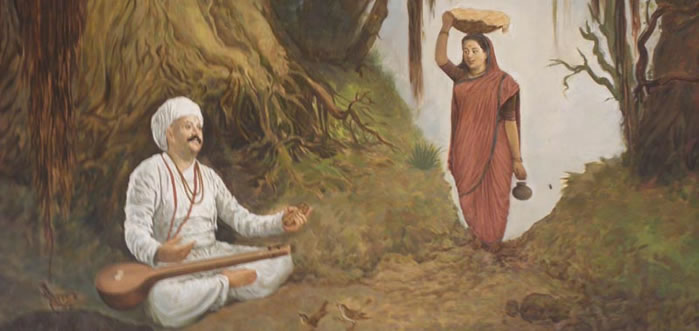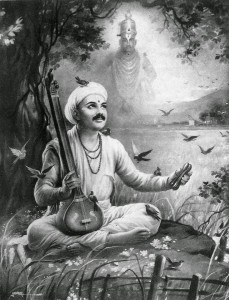The Lakshmi Pooja
One day, when Tukaram, known as Tuka, came home, he found his wife Jija performing a Lakshmi Pooja. Curious, he asked her what she was doing. Jija replied that she was performing a pooja for Rukmani. Puzzled by the sudden ritual, Tuka inquired about the occasion. Jija explained that an astrologer had advised her to do this pooja to gain more wealth.
Tuka, a devout follower of Vitthal, gently reminded her that Vitthal would provide for all their family’s needs. He told her that there was no need to perform rituals with the expectation of material gain. However, Jija argued that she was praying to Rukmani, Vitthal’s wife, and saw no harm in it.
Kamyartha Bhakti
Tuka explained that what she was practicing was kamyartha bhakti—praying to God with the expectation of receiving something in return—which he believed was not the right approach. Despite his advice, Jija continued with her poojas.
A few weeks later, Jija unexpectedly received some money. She bought new clothes for the children and herself, and even redeemed the mortgaged jewels. When Tuka came home for lunch and noticed the changes, he asked Jija what had happened. She proudly told him that she had reaped the benefits of doing the Lakshmi Pooja. Without a word, Tuka left the house, refusing to eat.
Tuka’s Disappearance
Jija thought he might be angry but would return by night. When he didn’t return for three days, she assumed he had gone to Pandharpur, a place he often visited without informing her. However, as weeks passed and Tuka did not return, Jija grew worried.
Determined to find him, Jija set out for Pandharpur, almost 300 kilometers from Dehu. She searched for him there but couldn’t find him. She asked the other sadhus if they had seen Tuka, but they hadn’t seen him for over a month. Distressed, Jija prayed to Vitthal in the temple and decided to spend the night there.
The Divine Revelation
That night, Vitthal appeared in her dream and told her that Tukaram was in Dehu, showing her the hill where he was sitting and singing his abhangs. He also mentioned that Tuka had not eaten since he left home.
The next morning, Jija rushed back to Dehu and climbed the hill to find Tuka. She saw him seated on a stone, weak and bearded, yet singing with the same fervor. Tears filled her eyes as she stood before him with folded hands.
The Reunion
When Tuka finished his abhang, he asked Jija why she had come. He expressed his desire to remain isolated and sing praises of Vitthal. Jija, weeping, asked how she and their children would survive without him. Tuka, still feeling hurt, reminded her that with her newfound wealth from the Lakshmi Pooja, she didn’t need him anymore.
Jija, crying, told him that he was more important to her than any jewels or money. Touched by her sincerity, Tuka asked her to distribute all the wealth to the poor and return to him as before. Jija complied, giving away their wealth, and returned to Tuka.
Tuka sang some abhangs to advise and console her. Finally, they returned home together, their bond strengthened by the ordeal.
Lessons to Be Learned
- Devotion and Responsibility:
- Taking responsibility for tasks, especially those related to devotion, should be done with utmost care and sincerity.
- Faith in Divine Provision:
- True faith involves trusting that the divine will provide for all needs without seeking material gains through rituals.
- Honesty and Transparency:
- Being honest and transparent with loved ones helps build trust and understanding.
- Prioritizing Relationships:
- Material wealth is transient, but relationships and love are enduring and should be prioritized.
- Humility and Repentance:
- Admitting one’s mistakes and seeking forgiveness with a sincere heart can mend relationships and bring about reconciliation.
- Compassion and Generosity:
- Sharing one’s wealth with those in need reflects true devotion and compassion, aligning with spiritual principles.
Conclusion
The story of Tuka and Jija’s Lakshmi Pooja teaches valuable lessons about faith, devotion, honesty, and the importance of relationships over material wealth. It highlights the significance of humility, repentance, and generosity in spiritual and familial life. Through their experience, Tuka and Jija reinforce the belief that sincere devotion and trust in the divine can overcome challenges and strengthen bonds.



